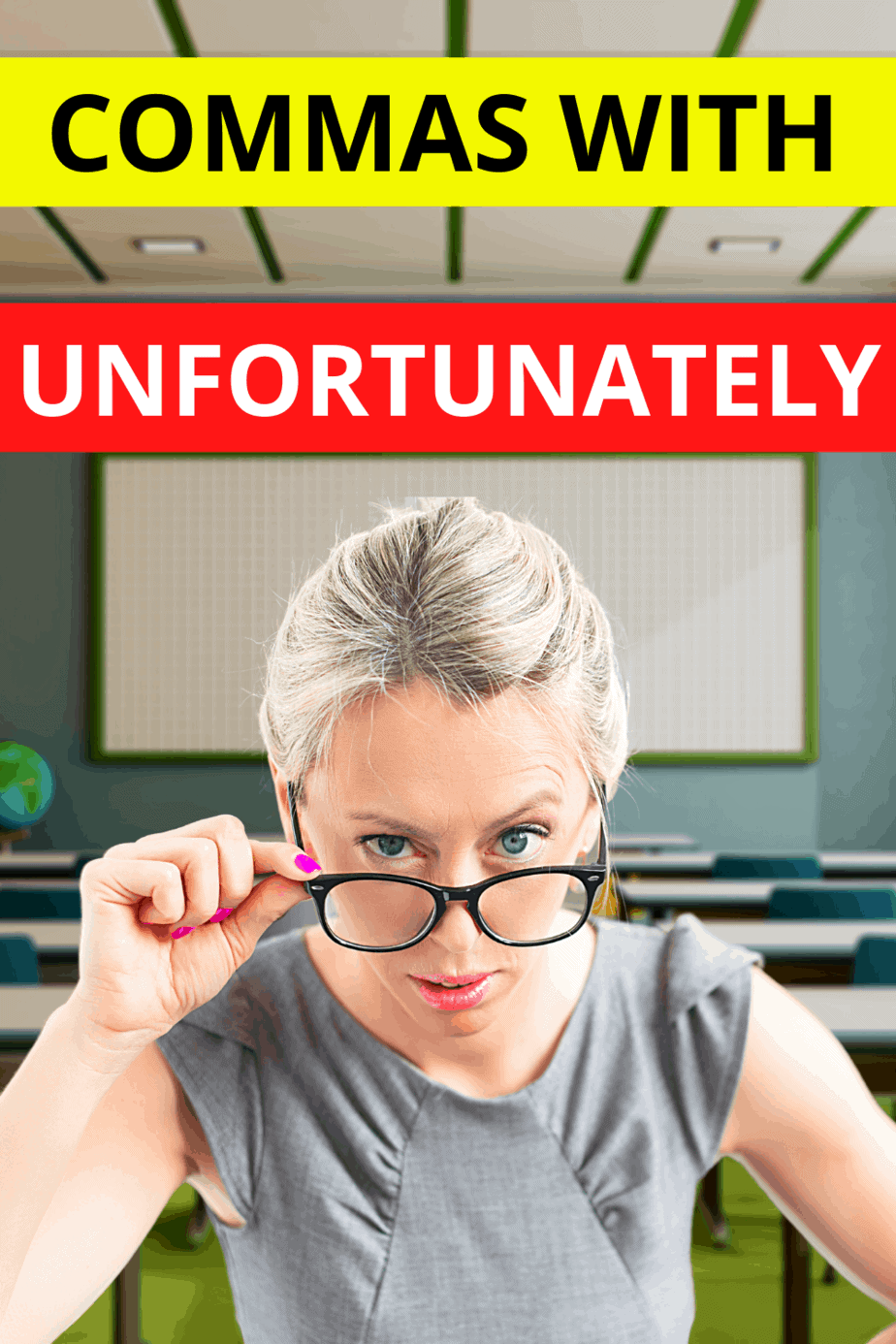While a ship navigates via radar and the three kings by a star, a reader is also guided by punctuations in texts.
Punctuations, in essence, serve as mountain beacons so readers so do not get lost in the savage jungle of words.
Without punctuations such as commas, sentences and paragraphs would be nonetheless incoherent and monotonous.
The following sections aim to provide some clarity on comma-related decisions together with the adverb that we use to express disappointment from unpleasant circumstances — unfortunately.
[toc]
Do we need a comma before or after “unfortunately”?
I’m guessing nobody would like the answer to the question above which is…it depends.
Commas may come before, after, and even both before and after unfortunately.
Typically, a comma is clipped before unfortunately when it appears in the middle of the sentence or at the end as a parenthetical entity or afterthought.
Meanwhile, a comma is placed after unfortunately when it is used as a disjunctive adverbial at the beginning of a clause.
Whereas, no commas are needed when it functions as an adverb of manner that modifies an adjacent verb, adjective, or adverb.

Comma before “unfortunately”
A comma insertion is utterly necessary when strategizing texts with parenthetical expressions.
Although these expressions help in creating a stylistic flavor to texts, they are also grammatically dispensable.
Using unfortunately as a parenthetical element
In discourse, we have the tendency to insert qualifying thoughts halfway through a statement or as a closing remark.
These speech elements are known as parentheses or parentheticals.
Parentheticals are responsible for providing extra layers of context to the information we wish to impart.
These expressions are grammatically inessential which means they are only added for rhetoric and interjectory purposes.
Unfortunately could be shoved in as an introduction to a parenthetical expression or as a one-man utterance.
When this is employed, a comma is always necessary before the adverb being discussed and right after unfortunately when used alone.
Comma after “unfortunately”
Another major task of the adverb being explained is to reflect the writer or speaker’s point of view by framing an entire clause. When this is applied to the word unfortunately, we refer to it as a disjunct adverbial.
Disjunctive adverbs are the kind of adverbials that enable the writer to express personal views and comments toward the intended written or oral information content which may appear as a word, phrase, or clause.
This means that disjunctive adverbials’ grammatical function is to modify the whole sentence; therefore, they are also referred to as sentential adverbials.
Disjuncts often come either at the beginning of the sentence and they are set off with a comma after to underscore the mood intended by the writer.
Unfortunately as a disjunctive adverb
As a disjunct, unfortunately implies emotions of disappointment or regret in an unfavorable circumstance.
Unluckily, sadly, and regrettably may also be used to replace this adverbial.
Say, for instance, you just got invited to an all-expense paid weekend getaway at the beach two weeks later, but you realized that the dates have already been booked by your boss for some out of town fieldwork.
Miserable, isn’t it?
Situations like this would normally prompt the use of unfortunately or other similar disjuncts.
When is a comma not necessary with unfortunately?
There are also other cases that do not necessitate comma usage before or after unfortunately.
This happens when its job in the sentence is to directly modify verbs, adjectives, and other adverbs.
Let’s look at some examples.
Unfortunately as a verbal modifier
One basic function of adverbs is to modify verbs in sentences to add extra spice to the action being done by the subject.
When unfortunately is used to modify verbs, we refer to it as an adverb of manner — adverbs that tell us how the action happens.
Normally, we place verb-modifying adverbs before simple present and past verbs, but after auxiliaries and modals.
Unfortunately as an adjectival modifier
Intensifying the meaning of adjectives can also be done by slipping an adverb before it.
When this is done with unfortunately, there is no need for comma placement either before or after it.
Moreover, always remember that adverbs always come before adjectives in sentences because while adverbs modify adjectives, adjectives do not modify adverbs.
Unfortunately as an adverbial modifier
The last case is with unfortunately modifying adverbs, again, with the purpose of adding an extra layer of supporting detail to other adverbs.
No comma is needed before or after unfortunately in this case too.
Conclusion
As we consume our daily dosage of information, our lexical repertoire continually expands as well.
One way to determine our linguistic competency is through our writing skills.
Effective writing strategies are a vital determinant of linguistic literacy which provides us with more confidence in handling more complex discourse.
The use of adverbial connectors and punctuations elicit writing proficiency; thus, they ought to be given importance.
In other words, constant writing practice, albeit arduous and time-consuming, incrementally increases our language skills; therefore, it is highly recommended.

Hey fellow Linguaholics! It’s me, Marcel. I am the proud owner of linguaholic.com. Languages have always been my passion and I have studied Linguistics, Computational Linguistics and Sinology at the University of Zurich. It is my utmost pleasure to share with all of you guys what I know about languages and linguistics in general.

